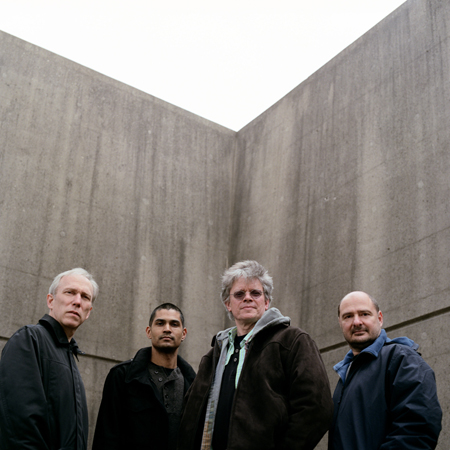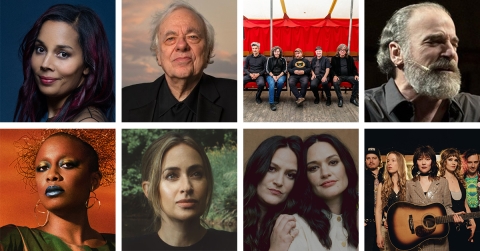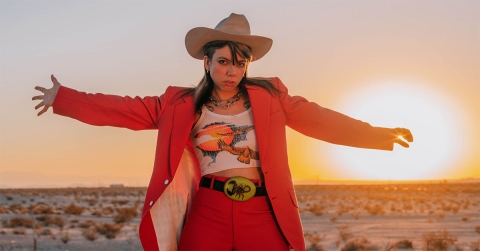Kronos Quartet is at the Barbican in London this weekend to launch a week-long residency entitled Awakenings. Kronos performs three concerts in three different venues, gives the world premiere of a major new work by Valentin Silvestrov, collaborates with two London choirs, and engages with young musicians and the public in a series of creative learning events. The Guardian calls it "voraciously ambitious in its musical range" and says: "Kronos have achieved more in getting the string quartet as a medium, and contemporary music as a creative force, into the global popular consciousness than pretty well any other ensemble."
Kronos Quartet is at the Barbican in London this weekend to launch an unprecedented week-long residency entitled Awakenings. Kronos performs three concerts in three different venues, gives the world premiere of a major new work by Valentin Silvestrov, collaborates with two London choirs (Trinity Laban Chamber Choir and the New London Children’s Choir), and engages with young musicians and the public in a series of creative learning events. Integral to Kronos’s work is a series of long-running, in-depth collaborations with many of the world’s foremost composers; these collaborations will take center stage throughout the concerts and events.
"Kronos have achieved more in getting the string quartet as a medium, and contemporary music as a creative force, into the global popular consciousness than pretty well any other ensemble," writes the Guardian's Tom Service in a feature on the week's events. "They've covered Nine Inch Nails and Jimi Hendrix, they've collaborated with musicians from India, China and Iraq, and have played, recorded and commissioned the greats of American music including Terry Riley, Philip Glass and Steve Reich."
Service describes this week's residency as "voraciously ambitious in its musical range" and talks with Kronos founder, vionlinist, and artistic director David Harrington about what to expect from the group this week and into the future. Read the article at guardian.co.uk.
The residency begins tomorrow with two quartet master classes with Junior Guildhall musicians. It continues on Sunday with Kronos Lab, a three-day workshop in which four emerging quartets are given the chance to explore contemporary repertoire with the members of Kronos Quartet. There will also be discussions around the rehearsal process, the art of collaboration, and building audiences. On Wednesday, January 25, a Kronos Talk event, open to the public, gives audiences a chance to discuss Kronos Quartet’s distinctive way of collaborating and commissioning, their approach to working with composers and the intriguing process of rehearsing a new work.
Each of the three concerts next week takes place in a different London venue and focuses on a specific theme. The first concert, Made in America, on Tuesday at Hackney Empire, features works by US composers. These include Bryce Dessner’s Aheym, Yiddish for “homeward”; Missy Mazzoli’s Harp and Altar for string quartet and electronics, a love song to the Brooklyn Bridge; the European premiere of Tyondai Braxton’s Uffe’s Woodshop, inspired by Danish architect and carpenter Uffe Surland Van Tams; and Thelonious Monk’s classic Round Midnight in an arrangement by Randall Woolf. There will also be three London premieres: Terry Riley’s Another Secret eQuation for string quartet and children’s choir; Exalted, a setting of the first line of the Mourner’s Kaddish by Bang on a Can co-founder Michael Gordon; and the 2008 staged version of Black Angels by George Crumb, inspired by the Vietnam War.
The second concert takes place on Thursday, January 26, at the Barbican and is entitled Awakening: A Musical Meditation on the Anniversary of 9/11. It is the UK premiere of a special program originally devised to mark the fifth anniversary of the events of 9/11, centered on two movements from Michael Gordon’s The Sad Park, which was inspired by recordings of New York school children’s reactions to the events of 9/11. The concert is a musical meditation with works from 11 different countries, including American Terry Riley’s "One Earth, One People, One Love," from Sun Rings, using sounds harvested from our solar system; Darkness 9/11 by Argentines Osvaldo Golijov and Gustavo Santaolalla (from the film 11’9’‘01); Finnish Aulis Sallinen’s Winter Was Hard, performed together with the New London Children’s Choir; Russian Vladimir Martynov’s The Beatitudes arranged for pre-recorded quartet and live quartet (which can be heard on Kronos Quartet’s latest album, Music of Vladimir Martynov, released earlier this month on Nonesuch Records); Canadian John Oswald’s Spectre for 1001 string quartet reflections; and the title composition from another long-time Kronos collaborator, Uzbek composer Dmitri Yanov-Yanovsky which features the adhân (the Muslim call to prayer) and multi-track tape. Further program highlights include an arrangement of a piece by German industrial group Einstürzende Neubauten that originates in an Armenian folk song, as well as music from Iraq, Iran, India, and Sweden.
The third concert, Early Music, takes place next Friday, January 27, at Wilton’s Music Hall. For this concert, the group interprets "early" in broader ways than the common definition of Early Music. In some cases the pieces are early works in a composer’s output like in Morton Feldman’s Structures; in the case of Nicole Lizée’s Death to Kosmische—which incorporates two archaic pieces of music technology (the Stylophone and the Omnichord)—it's a reference to early electronic music. "Early" also refers to a different mode of human existence, as in traditional works based on recordings from Georgia and the Central African Republic. Further program highlights are Alfred Schnittke’s Collected Songs Where Every Verse is Filled with Grief, Witold Lutoslawski’s "Funebre" from String Quartet (1964), the world premiere of String Quartet No. 3 by Valentin Silvestrov, an arrangement of Hildegard von Bingen’s O Virtus Sapientie, Anton Webern’s Six Bagatelles, Bob Dylan’s Don’t Think Twice, It’s All Right in an arrangement by Philip Glass, and the European premiere of Glass’s Modern Love Waltz in an arrangement by Kronos.
For complete listings of the Kronos Quartet residency at the Barbican, visit barbican.org.uk/kronosquartet.
To pick up a copy of Kronos Quartet's latest Nonesuch release, Music of Vladimir Martynov, and to peruse the group's complete Nonesuch catalog, head to the Nonesuch Store now.
- Log in to post comments



